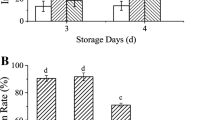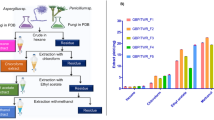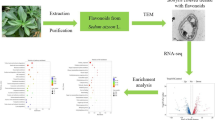Abstract
Blue mold caused by Penicillium expansum (P. expansum) causes severe fruit losses, and there is an urgent need to explore safe natural products to control post-harvest diseases and investigate potential antifungal mechanisms. In this study, flavonoids (GBLF) were extracted and purified from mature Ginkgo biloba leaves (GBL). According to an analysis of UV-visible spectroscopy, FTIR, and LC-MS, GBLF contained 10 flavonoids, including 8 quercetin and kaempferol derivatives. The inhibition halo diameter by GBLF ethanol solution reached a maximum of 11.2 ± 0.3 mm, which significantly inhibited the growth of P. expansum. In the GBLF ethanol solution treatment trial, the mycelial cells of P. expansum reached their maximum cell conductivity, protein leakage rate, and malondialdehyde (MDA) content at 48 h, with values of 3.89 ± 0.17 ms/cm, 5.22 ± 0.08 mg/L, and 5.76 ± 0.09 mmol/kg, respectively, which were 2.7, 13.74, and 4.76 times higher than those of the control. Compared with 12 h, the activities of superoxide dismutase (SOD), catalase (CAT), and peroxidase (POD) in the enzyme antioxidant system were 3.38 ± 0.11 U/mg, 5.23 ± 0.09 U/mg, and 2.66 ± 0.10 U/mg, respectively, which decreased by 30.2%, 20.09%, and 51.47%. In conclusion, quercetin and kaempferol derivatives in GBLF may act on P. expansum by increasing the permeability of cell membranes, reducing enzymatic antioxidant activity, and accelerating lipid peroxidation.
Graphical Abstract







Similar content being viewed by others
Data Availability
The datasets generated during the current study are available from the corresponding author on reasonable request.
References
Araújo, K. C. F., & de M.B. Costa, E.M., Pazini, F., Valadares, M.C., de Oliveira, V.,. (2013). Bioconversion of quercetin and rutin and the cytotoxicity activities of the transformed products. Food and Chemical Toxicology, 51, 93–96. https://doi.org/10.1016/j.fct.2012.09.015
Bhavya, M. L., Shewale, S. R., Rajoriya, D., & Hebbar, H. U. (2021). Impact of blue LED illumination and natural photosensitizer on bacterial pathogens, enzyme activity and quality attributes of fresh-cut pineapple slices. Food and Bioprocess Technology, 14, 362–372. https://doi.org/10.1007/s11947-021-02581-7
Bondy, S. C. (1992). Ethanol toxicity and oxidative stress. Toxicology Letters, 63, 231–241. https://doi.org/10.1016/0378-4274(92)90086-Y
Bradford, M. M. (1976). A rapid and sensitive method for the quantitation of microgram quantities of protein utilizing the principle of protein-dye binding. Analytical Biochemistry, 72, 248–254. https://doi.org/10.1016/0003-2697(76)90527-3
Chen, C., Wan, C., Peng, X., & Chen, J. (2020a). A flavonone pinocembroside inhibits Penicillium italicum growth and blue mold development in ‘Newhall’ navel oranges by targeting membrane damage mechanism. Pesticide Biochemistry and Physiology, 165, 104505. https://doi.org/10.1016/j.pestbp.2019.11.025
Chen, S., Li, X., Liu, X., Wang, N., An, Q., Ye, X. M., Zhao, Z. T., Zhao, M., Han, Y., Ouyang, K. H., & Wang, W. J. (2020b). Investigation of chemical composition, antioxidant activity, and the effects of alfalfa flavonoids on growth performance. Oxidative Medicine and Cellular Longevity, 2020, 1–11. https://doi.org/10.1155/2020/8569237
Cohen, G., Sinet, P. M., & Heikkila, R. (1980). Ethanol oxidation by rat brain in vivo. Alcoholism: Clinical and Experimental Research, 4, 366–370. https://doi.org/10.1111/j.1530-0277.1980.tb04833.x
Cushnie, T. P. T., & Lamb, A. J. (2011). Recent advances in understanding the antibacterial properties of flavonoids. International Journal of Antimicrobial Agents, 38, 99–107. https://doi.org/10.1016/j.ijantimicag.2011.02.014
Dao, T. (2008). Inactivation of conidia of Penicillium chrysogenum, P. digitatum and P. italicum by ethanol solutions and vapours. International Journal of Food Microbiology, 122, 68–73. https://doi.org/10.1016/j.ijfoodmicro.2007.11.054
Dong, L. M. (2019). Evaluation of the synergistic effect of ethanol and lemongrass oil against Aspergillus niger. Journal of Microbiology, Biotechnology and Food Sciences, 8, 1312–1316. https://doi.org/10.15414/jmbfs.2019.8.6.1312-1316
Düz, M., Korcan, S. E., & Akkuş, G. U. (2021). Determination of total phenolic, flavonoid content and antimicrobial properties in different solvent extracts of Viburnum opulus L. (Gilaburu) in Afyonkarahisar. Pakistan Journal of Analytical and Environmental Chemistry, 22, 388–395. https://doi.org/10.21743/pjaec/2021.12.17
El-Sayed, H. S., Youssef, K., & Hashim, A. F. (2022). Stirred yogurt as a delivery matrix for freeze-dried microcapsules of synbiotic EVOO nanoemulsion and nanocomposite. Frontiers in Microbiology, 13, 893053. https://doi.org/10.3389/fmicb.2022.893053
Fallanaj, F., Sanzani, S. M., Youssef, K., Zavanella, C., Salerno, M. G., & Ippolito, A. (2015). A new perspective in controlling postharvest citrus rots: The use of electrolyzed water. Acta Horticulturae, 1599–1606. https://doi.org/10.17660/ActaHortic.2015.1065.204
Fathima, A., & Rao, J. R. (2016). Selective toxicity of catechin—a natural flavonoid towards bacteria. Applied Microbiology and Biotechnology, 100, 6395–6402. https://doi.org/10.1007/s00253-016-7492-x
Feng, Y., Yuan, D., Cao, C., Kong, B., Sun, F., Xia, X., & Liu, Q. (2022). Changes of in vitro digestion rate and antioxidant activity of digestion products of ethanol-modified whey protein isolates. Food Hydrocolloids, 131, 107756. https://doi.org/10.1016/j.foodhyd.2022.107756
Freedman, P., & Smith, E. C. (1975). Acute renal failure. Heart and Lung, 4, 873–878.
Garcia-Salas, P., Morales-Soto, A., Segura-Carretero, A., & Fernández-Gutiérrez, A. (2010). Phenolic-compound-extraction systems for fruit and vegetable samples. Molecules, 15, 8813–8826. https://doi.org/10.3390/molecules15128813
Ge, Y., Wei, M., Li, C., Chen, Y., Lv, J., Meng, K., Wang, W., & Li, J. (2018). Reactive oxygen species metabolism and phenylpropanoid pathway involved in disease resistance against Penicillium expansum in apple fruit induced by ϵ -poly- l -lysine: Disease resistance against Penicillium expansum in apple fruit induced by ϵ -poly- l -lysine. Journal of the Science of Food and Agriculture, 98, 5082–5088. https://doi.org/10.1002/jsfa.9046
Górniak, I., Bartoszewski, R., & Króliczewski, J. (2019). Comprehensive review of antimicrobial activities of plant flavonoids. Phytochemistry Reviews, 18, 241–272. https://doi.org/10.1007/s11101-018-9591-z
Hamed, Y. S., Abdin, M., Akhtar, H. M. S., Chen, D., Wan, P., Chen, G., & Zeng, X. (2019). Extraction, purification by macrospores resin and in vitro antioxidant activity of flavonoids from Moringa oliefera leaves. South African Journal of Botany, 124, 270–279. https://doi.org/10.1016/j.sajb.2019.05.006
Hao, P.-Y., Feng, Y.-L., Zhou, Y.-S., Song, X.-M., Li, H.-L., Ma, Y., Ye, C.-L., & Yu, X.-P. (2018). Schaftoside interacts with NlCDK1 protein: A mechanism of rice resistance to brown planthopper. Nilaparvata Lugens. Front. Plant Sci., 9, 710. https://doi.org/10.3389/fpls.2018.00710
Haraguchi, H., Tanimoto, K., Tamura, Y., Mizutani, K., & Kinoshita, T. (1998). Mode of antibacterial action of retrochalcones from Glycyrrhiza inflata. Phytochemistry, 48, 125–129. https://doi.org/10.1016/S0031-9422(97)01105-9
Jiang, L., Belwal, T., Huang, H., Ge, Z., Limwachiranon, J., Zhao, Y., Li, L., Ren, G., & Luo, Z. (2019). Extraction and characterization of phenolic compounds from bamboo shoot shell under optimized ultrasonic-assisted conditions: A potential source of nutraceutical compounds. Food and Bioprocess Technology, 12, 1741–1755. https://doi.org/10.1007/s11947-019-02321-y
Jin, Y.-S. (2019). Recent advances in natural antifungal flavonoids and their derivatives. Bioorganic & Medicinal Chemistry Letters, 29, 126589. https://doi.org/10.1016/j.bmcl.2019.07.048
Kou, X.-H., Guo, W., Guo, R., Li, X., & Xue, Z. (2014). Effects of chitosan, calcium chloride, and pullulan coating treatments on antioxidant activity in pear cv. “Huang guan” during storage. Food and Bioprocess Technology, 7, 671–681. https://doi.org/10.1007/s11947-013-1085-9
Li, Y., Deng, H., Ju, L., Zhang, X., Zhang, Z., Yang, Z., Wang, L., Hou, Z., & Zhang, Y. (2016). Screening and validation for plasma biomarkers of nephrotoxicity based on metabolomics in male rats. Toxicol. Res., 5, 259–267. https://doi.org/10.1039/C5TX00171D
Lin, Y., Chen, G., Lin, H., Lin, M., Wang, H., & Lin, Y. (2020). Chitosan postharvest treatment suppresses the pulp breakdown development of longan fruit through regulating ROS metabolism. International Journal of Biological Macromolecules, 165, 601–608. https://doi.org/10.1016/j.ijbiomac.2020.09.194
Liu, X.-G., Lu, X., Gao, W., Li, P., & Yang, H. (2022). Structure, synthesis, biosynthesis, and activity of the characteristic compounds from Ginkgo biloba L. Natural Products Reports, 39, 474–511. https://doi.org/10.1039/D1NP00026H
Liu, Z.-L., Staniszewska, I., Zielinska, D., Zhou, Y.-H., Nowak, K. W., Xiao, H.-W., Pan, Z., & Zielinska, M. (2020). Combined hot air and microwave-vacuum drying of cranberries: Effects of pretreatments and pulsed vacuum osmotic dehydration on drying kinetics and physicochemical properties. Food and Bioprocess Technology, 13, 1848–1856. https://doi.org/10.1007/s11947-020-02507-9
Liza, M. S., Abdul Rahman, R., Mandana, B., Jinap, S., Rahmat, A., Zaidul, I. S. M., & Hamid, A. (2010). Supercritical carbon dioxide extraction of bioactive flavonoid from Strobilanthes crispus (Pecah Kaca). Food and Bioproducts Processing, 88, 319–326. https://doi.org/10.1016/j.fbp.2009.02.001
Lu, X., Wang, J., Al-Qadiri, H. M., Ross, C. F., Powers, J. R., Tang, J., & Rasco, B. A. (2011). Determination of total phenolic content and antioxidant capacity of onion (Allium cepa) and shallot (Allium oschaninii) using infrared spectroscopy. Food Chemistry, 129, 637–644. https://doi.org/10.1016/j.foodchem.2011.04.105
Lü, X., Yi, L., Dang, J., Dang, Y., & Liu, B. (2014). Purification of novel bacteriocin produced by Lactobacillus coryniformis MXJ 32 for inhibiting bacterial foodborne pathogens including antibiotic-resistant microorganisms. Food Control, 46, 264–271. https://doi.org/10.1016/j.foodcont.2014.05.028
Luo, J., Xu, F., Zhang, X., Shao, X., Wei, Y., & Wang, H. (2020). Transcriptome analysis of Penicillium italicum in response to the flavonoids from Sedum aizoon L. World Journal of Microbiology & Biotechnology, 36, 62. https://doi.org/10.1007/s11274-020-02836-z
Marianna, S., & Ippolito, A. (2011). State of the art and future prospects of alternative control means against postharvest blue mould of apple: Exploiting the induction of resistance. In Thajuddin, N. (Ed.), Fungicides - Beneficial and Harmful Aspects. InTech. https://doi.org/10.5772/26548
Masek, A., Chrzescijanska, E., Kosmalska, A., & Zaborski, M. (2014). Characteristics of compounds in hops using cyclic voltammetry, UV–VIS, FTIR and GC–MS analysis. Food Chemistry, 156, 353–361. https://doi.org/10.1016/j.foodchem.2014.02.005
Nalla, R., Pinge, R., Narwaria, M., & Chaudhury, B. (2018). Priority based functional group identification of organic molecules using machine learning. In Proceedings of the ACM India Joint International Conference on Data Science and Management of Data. ACM, Goa India, pp. 201–209. https://doi.org/10.1145/3152494.3152522
Omidkhoda, S. F., Razavi, B. M., & Hosseinzadeh, H. (2019). Protective effects of Ginkgo biloba L. against natural toxins, chemical toxicities, and radiation: A comprehensive review. Phytotherapy Research, 33, 2821–2840. https://doi.org/10.1002/ptr.6469
Orth, A. B., Sfarra, A., Pell, E. J., & Tien, M. (1992). An investigation into the role of lipid peroxidation in the mode of action of aromatic hydrocarbon and dicarboximide fungicides. Pesticide Biochemistry and Physiology, 44, 91–100. https://doi.org/10.1016/0048-3575(92)90106-A
Papastergiadis, A., Mubiru, E., Van Langenhove, H., & De Meulenaer, B. (2012). Malondialdehyde measurement in oxidized foods: Evaluation of the spectrophotometric thiobarbituric acid reactive substances (TBARS) test in various foods. Journal of Agriculture and Food Chemistry, 60, 9589–9594. https://doi.org/10.1021/jf302451c
Patle, T. K., Shrivas, K., Kurrey, R., Upadhyay, S., Jangde, R., & Chauhan, R. (2020). Phytochemical screening and determination of phenolics and flavonoids in Dillenia pentagyna using UV–vis and FTIR spectroscopy. Spectrochimica Acta Part a: Molecular and Biomolecular Spectroscopy, 242, 118717. https://doi.org/10.1016/j.saa.2020.118717
Perumal Samy, R., & Gopalakrishnakone, P. (2010). Therapeutic potential of plants as anti-microbials for drug discovery. Evidence-Based Complementary and Alternative Medicine, 7, 283–294. https://doi.org/10.1093/ecam/nen036
Pietta, P., & Mauri, P. (2001). Analysis of flavonoids in medicinal plants. In Methods in Enzymology. Elsevier, pp. 26–45. https://doi.org/10.1016/S0076-6879(01)35229-1
Plaper, A., Golob, M., Hafner, I., Oblak, M., Šolmajer, T., & Jerala, R. (2003). Characterization of quercetin binding site on DNA gyrase. Biochemical and Biophysical Research Communications, 306, 530–536. https://doi.org/10.1016/S0006-291X(03)01006-4
Ražná, K., Sawinska, Z., Ivanišová, E., Vukovic, N., Terentjeva, M., Stričík, M., Kowalczewski, P. Ł., Hlavačková, L., Rovná, K., Žiarovská, J., & Kačániová, M. (2020). Properties of Ginkgo biloba L.: Antioxidant characterization, antimicrobial activities, and genomic MicroRNA based marker fingerprints. IJMS, 21, 3087. https://doi.org/10.3390/ijms21093087
Routray, W., & Orsat, V. (2012). Microwave-assisted extraction of flavonoids: A review. Food and Bioprocess Technology, 5, 409–424. https://doi.org/10.1007/s11947-011-0573-z
Sant, D. G., Tupe, S. G., Ramana, C. V., & Deshpande, M. V. (2016). Fungal cell membrane-promising drug target for antifungal therapy. Journal of Applied Microbiology, 121, 1498–1510. https://doi.org/10.1111/jam.13301
Sanver, D., Murray, B. S., Sadeghpour, A., Rappolt, M., & Nelson, A. L. (2016). Experimental modeling of flavonoid–biomembrane interactions. Langmuir, 32, 13234–13243. https://doi.org/10.1021/acs.langmuir.6b02219
Tao, N., Chen, Y., Wu, Y., Wang, X., Li, L., & Zhu, A. (2019). The terpene limonene induced the green mold of citrus fruit through regulation of reactive oxygen species (ROS) homeostasis in Penicillium digitatum spores. Food Chemistry, 277, 414–422. https://doi.org/10.1016/j.foodchem.2018.10.142
Teixeira, G. M., Mosela, M., Nicoletto, M. L. A., Ribeiro, R. A., Hungria, M., Youssef, K., Higashi, A. Y., Mian, S., Ferreira, A. S., Gonçalves, L. S. A., Pereira, U. D. P., & De Oliveira, A. G. (2021). Genomic insights into the antifungal activity and plant growth-promoting ability in Bacillus velezensis CMRP 4490. Frontiers in Microbiology, 11, 618415. https://doi.org/10.3389/fmicb.2020.618415
Tsuchiya, H. (2015). Membrane interactions of phytochemicals as their molecular mechanism applicable to the discovery of drug leads from plants. Molecules, 20, 18923–18966. https://doi.org/10.3390/molecules201018923
Van Kampen, J. J. A., Burgers, P. C., De Groot, R., Gruters, R. A., & Luider, T. M. (2011). Biomedical application of MALDI mass spectrometry for small-molecule analysis: Small-molecule MALDI. Mass Spectrometry Reviews, 30, 101–120. https://doi.org/10.1002/mas.20268
Vidinamo, F., Fawzia, S., & Karim, M. A. (2022). Investigation of the effect of drying conditions on phytochemical content and antioxidant activity in pineapple (Ananas comosus). Food and Bioprocess Technology, 15, 72–81. https://doi.org/10.1007/s11947-021-02715-x
Wang, K., Ge, Q., Shao, X., Wei, Y., Zhang, X., Wang, H., & Xu, F. (2023). The antifungal efficacy of flavonoids from Sedum aizoon L. on grapes. Food Bioprocess Technology. https://doi.org/10.1007/s11947-023-03165-3
Wang, K.-W., & Zhang, T.-T. (2020). Bioactive Flavonoids from Verbenaceae. MROC, 17, 754–766. https://doi.org/10.2174/1570193X16666191007170602
Wang, Z., Ding, Z., Li, Z., Ding, Y., Jiang, F., & Liu, J. (2021a). Antioxidant and antibacterial study of 10 flavonoids revealed rutin as a potential antibiofilm agent in Klebsiella pneumoniae strains isolated from hospitalized patients. Microbial Pathogenesis, 159, 105121. https://doi.org/10.1016/j.micpath.2021.105121
Wang, Z., Yuan, G., Pu, H., Shan, S., Zhang, Z., Song, H., & Xu, X. (2021b). 1-Methylcyclopropene suppressed the growth of Penicillium digitatum and inhibited the green mould in citrus fruit. Journal of Phytopathology, 169, 83–90. https://doi.org/10.1111/jph.12961
Wu, Z., Yin, X., Lin, Z., Bañuelos, G. S., Yuan, L., Liu, Y., & Li, M. (2014). Inhibitory effect of selenium against Penicillium expansum and its possible mechanisms of action. Current Microbiology, 69, 192–201. https://doi.org/10.1007/s00284-014-0573-0
Yang, D., Wang, T., Long, M., & Li, P. (2020). Quercetin: Its main pharmacological activity and potential application in clinical medicine. Oxidative Medicine and Cellular Longevity, 2020, 1–13. https://doi.org/10.1155/2020/8825387
Yang, J., Chen, Y.-Z., Yu-Xuan, W., Tao, L., Zhang, Y.-D., Wang, S.-R., Zhang, G.-C., & Zhang, J. (2021). Inhibitory effects and mechanisms of vanillin on gray mold and black rot of cherry tomatoes. Pesticide Biochemistry and Physiology, 175, 104859. https://doi.org/10.1016/j.pestbp.2021.104859
Yang, J., Wang, A.-Q., Li, X., Fan, X., Yin, S.-S., & Lan, K. (2016). A chemical profiling strategy for semi-quantitative analysis of flavonoids in Ginkgo extracts. Journal of Pharmaceutical and Biomedical Analysis, 123, 147–154. https://doi.org/10.1016/j.jpba.2016.02.017
Yang, J., Zhang, Z., Pang, W., Chen, H., & Yan, G. (2019). Polyamidoamine dendrimers functionalized magnetic carbon nanotubes as an efficient adsorbent for the separation of flavonoids from plant extraction. Separation and Purification Technology, 227, 115710. https://doi.org/10.1016/j.seppur.2019.115710
Yu, L., Qiao, N., Zhao, J., Zhang, H., Tian, F., Zhai, Q., & Chen, W. (2020). Postharvest control of Penicillium expansum in fruits: A review. Food Bioscience, 36, 100633. https://doi.org/10.1016/j.fbio.2020.100633
Zhang, J. (2022). Evaluation of Aspergillus aculeatus GC-09 for the biological control of citrus blue mold caused by Penicillium italicum. Fungal Biology, 12.
Zhang, X., Zong, Y., Li, Z., Yang, R., Li, Z., Bi, Y., & Prusky, D. (2020). Postharvest Pichia guilliermondii treatment promotes wound healing of apple fruits. Postharvest Biology and Technology, 167, 111228. https://doi.org/10.1016/j.postharvbio.2020.111228
Zhou, Q., Rather, L. J., Mir, S. S., Ali, A., Rizwanul Haque, Q. M., & Li, Q. (2022). Bio colourants from the waste leaves of Ginkgo biloba L. tree: wool dyeing and antimicrobial functionalization against some antibiotic-resistant bacterial strains. Sustainable Chemistry and Pharmacy, 25, 100585. https://doi.org/10.1016/j.scp.2021.100585
Funding
This work was supported by the National Key R & D Program of China (2021YFD2100100) and the National Natural Science Foundation of China (32171836).
Author information
Authors and Affiliations
Contributions
Dong Zhang participated in the experiment and wrote the manuscript. Xiaohan Zhang looked for experimental methods and conducted experiments. Shuhong Ye supervised the experiment and wrote, commented, and edited the manuscript at the same time. Dong Zhang and Yan Ding analyzed the experiment results. Dingding Feng and Yu Fan conducted experiments and investigations.
Corresponding author
Ethics declarations
Competing Interests
The authors declare no competing interests.
Additional information
Publisher's Note
Springer Nature remains neutral with regard to jurisdictional claims in published maps and institutional affiliations.
Rights and permissions
Springer Nature or its licensor (e.g. a society or other partner) holds exclusive rights to this article under a publishing agreement with the author(s) or other rightsholder(s); author self-archiving of the accepted manuscript version of this article is solely governed by the terms of such publishing agreement and applicable law.
About this article
Cite this article
Zhang, D., Zhang, X., Ding, Y. et al. Effect of Ginkgo biloba Leaf Flavonoids on the Growth and Enzymatic Oxidation Systems of Penicillium expansum. Food Bioprocess Technol (2024). https://doi.org/10.1007/s11947-024-03345-9
Received:
Accepted:
Published:
DOI: https://doi.org/10.1007/s11947-024-03345-9




